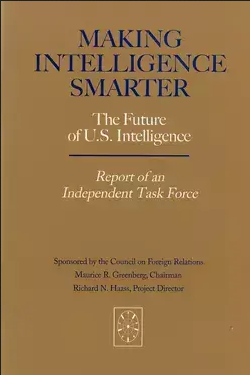Making Intelligence Smarter
(report) | |
|---|---|
 | |
| Type | report |
| Publication date | 1996 |
| Founder(s) | CFR |
| Author(s) | • • • Paul Bracken • • James H. Evans • • Paul E. Gray • Maurice R. Greenberg • • • William Hood • Cordell Hull (Bechtel) • • Joshua Lederberg • • Merrill A. Mcpeak • Lionel Olmer • Edwin J. Pechous • • • Angela E. Stent • Gordon Russell Sullivan • Robert C. Waggoner • John L. Weinberg • Frank G. Zarb • Charles Battaglia • • Britt Snider |
| Source | Link |
| A very spooky Council on Foreign Relations task force recommending among other things continued large budgets and overturning bans on CIA members posing as journalists and members of the clergy in covert operations overseas. | |
Making Intelligence Smarter was a 1996 report by a a very spooky Council on Foreign Relations task force[1].
Own words
The report offers judgments and makes recommendations on some of the most important questions affecting the future of U.S. national security: priorities for intelligence collection, the role of economic intelligence, improving analysis and increasing its impact, the future of clandestine activities, reorganizing the intelligence community, intelligence ties with both the military and law enforcement, and congressional and public oversight.[2]
Recommendations
The report, made at a time when there were no obvious enemies warranting a budgets, concluded that "a large budgetary peace dividend in the intelligence area is unlikely.[3]
The "blue ribbon" task force recommended that "policymakers consider overturning a twenty-year old executive order that bans CIA members from posing as journalists and members of the clergy in covert operations overseas.[4] "The Task Force recommended that a fresh look be taken at limits on the use of non-official covers for hiding and protecting those involved in clandestine activities.[3]
"FBI and Drug Enforcement Agency (DEA) agents operating abroad should not be allowed to act independently of the ambassador or the CIA".[3]
The task force wanted to secure that "their" people stayed in control - "Limits on how long any member of congress can serve on an intelligence committee should be removed".[3]
The task force suggested rotating spooks through academia and business: "A greater flow of talented people into the agency from academia and business is essential. Greater provision ought to be made for lateral and mid-career entry as well as for short-term entry (measured in weeks, months, or years) or even for just a single, short-duration project. In this way the intelligence community could attract and exploit some of the best minds from academia and other sections of society that would otherwise not be available."[3] "Intelligence professionals must understand the needs of policymakers and vice versa. One way to do so is through regular rotation of career intelligence officers into positions in the policymaking departments (State, Defense, Treasury, etc.) and the NSC. Temporary assignment to the relevant congressional staffs should also be an option. Sabbaticals in academia or business would be similarly useful; indeed, such rotations should be required for promotion to senior levels."[3] Several of the task force members were business leaders (John L. Weinberg from Goldman Sachs, James D. Robinson III from American Express who might have had some experience of this).
References
- ↑ https://www.cfr.org/report/making-intelligence-smarter
- ↑ https://www.cfr.org/report/making-intelligence-smarter
- ↑ Jump up to: a b c d e f https://cdn.cfr.org/sites/default/files/pdf/1998/09/Making_Intelligence_Smarter.pdf
- ↑ https://www.rcfp.org/blue-ribbon-panel-suggests-spies-pose-journalists-and-priests/